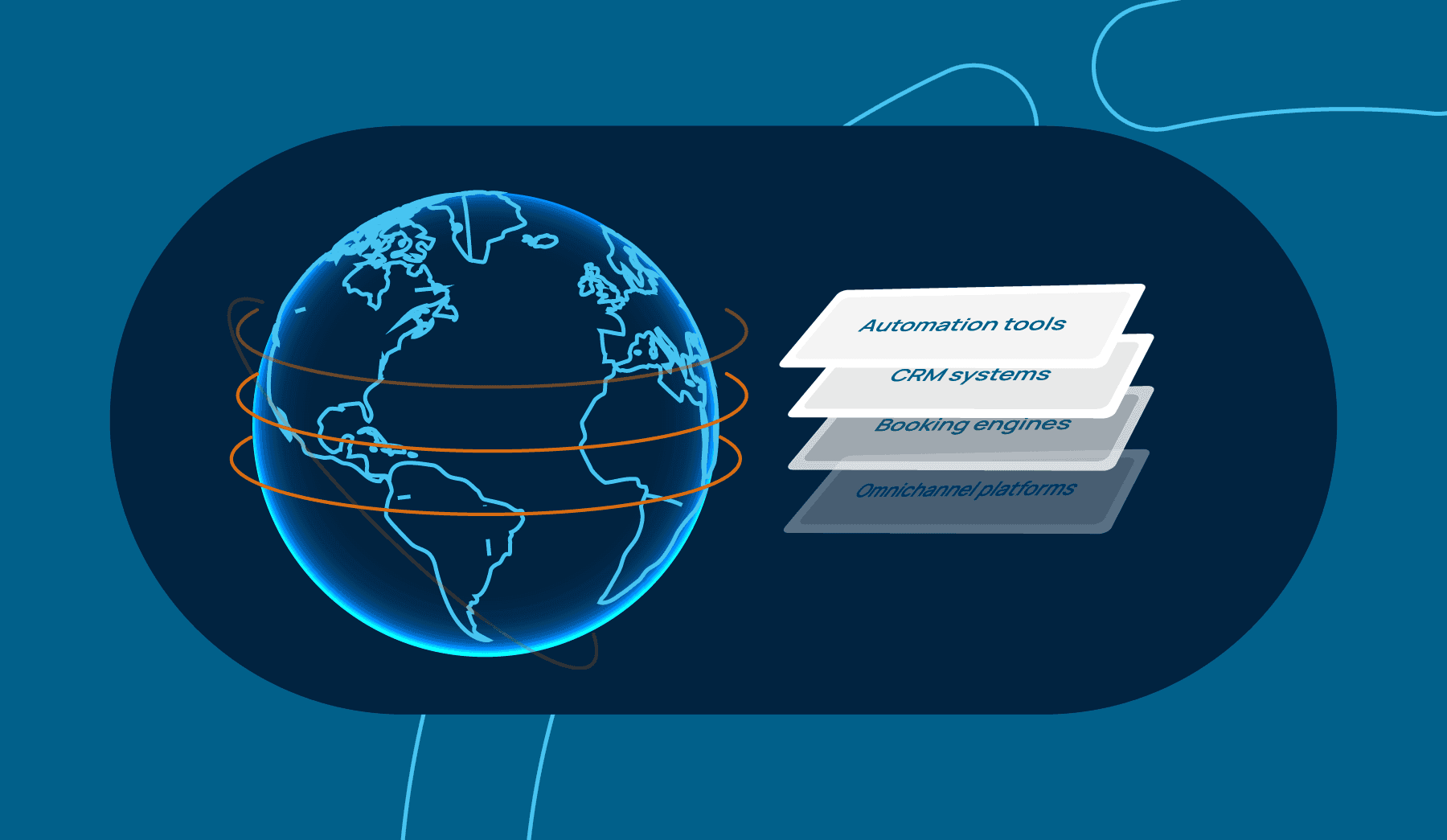The API Trap: Are Endless Integrations Devouring Your Profits?

APIs have undeniably transformed the industry. With a few lines of code, you can tap into Amadeus, Sabre, and Travelport to access global air inventory. You can plug into IndiGo, Ryanair, or AirAsia for low-cost carrier fares. You can pull hotel content from Hotelbeds, Agoda, and Expedia Rapid API to expand your accommodation options overnight. And with IATA’s NDC APIs (adopted by Lufthansa, British Airways, and others), OTAs now enjoy direct airline control and potentially better fares.
It all sounds frictionless—until reality kicks in.
Each API brings its own schema, quirks, and upgrade cycles. Teams spend weeks mapping fields, testing edge cases, and firefighting version updates. Integration pipelines multiply like unchecked vines, strangling innovation and slowing you down when speed-to-market matters most.
But what happens when managing these APIs starts feeling like herding cats in a storm?
For many TAs, OTAs, and TMCs, the API boom has morphed into a trap—where the operational load outweighs the business gain. Read this insight to understand how what was supposed to make you unstoppable—Travel Supplier APIs—has become the very speed breaker, and how you may tackle it to keep cruising towards growth and innovation.
The Hidden Cost of API Integration Overload
On the surface, adding APIs feels like patching holes in your ship mid-voyage—until you realize the patches themselves are springing leaks. What starts as a sprint to connect with an NDC supplier or onboard a GDS soon mutates into a labyrinth of bespoke integrations. Each supplier speaks a different dialect; every schema is a riddle; version upgrades arrive uninvited like typhoons in peak season.
As technical complexity mounts, teams lag in keeping up with the market, and cracks start to appear in the customer experience. Search latency increases, booking flows stall, and your high-intent users quietly slip away to your faster rivals.
Meanwhile, your development team is caught in a maintenance hamster wheel—chasing endless supplier updates, QA cycles, and last-minute hotfixes. Big-ticket features stall because bandwidth is drained into keeping your infrastructure barely up and running.
The domino effect doesn’t stop there. Quite often, disconnected systems mean ops teams are forced into manual reconciliations, juggling spreadsheets for credit control, and firefighting reporting gaps. Basically, every API you add brings with it an invisible tax—on time, on talent, on focus. This is not what travel content APIs were supposed to do to your business; instead, they were meant to accelerate your business. However, with the usual approach of integrating individual supplier APIs into your travel booking platform, the APIs are slowly eating into your margins and tethering you to technical debt.
Why API Spaghetti Can Lead To Growth Paralysis in 2025
In 2025, the travel ecosystem isn’t waiting for anyone to catch up. Many large OTAs and thriving TMCs are already pouring investments into AI-ready platforms and hyper-personalized experiences for their clients. They are probably devouring the market share of those who are still playing wait and watch. Yup, some agencies are mired in API firefighting—losing not just technical edge but precious time in a market where agility is currency.
Add to this the weight of evolving geo-politics, new policies, and new-age compliance—GDPR, PCI DSS, data localization norms—and suddenly your once-lean tech stack feels like a bloated relic. Cost-conscious corporations expect seamless expense control; leisure travelers demand split-second search results. There’s no margin left for delays, downtime, or disconnected workflows.
And here’s the hard truth: when your mobile app or booking platform freezes mid-search or your booking flow stalls for a millisecond, customers don’t blame the API ecosystem. They blame you. And in no time, you find yourself dabbling with customer churn, revenue nosediving, and every other critical KPI flashing danger red.
So, the real question isn’t whether you can keep up with supplier updates. The question is “Whether your tech stack can keep pace with the industry’s velocity and customer expectations?” If yes, “How?”
The Way Out: Integrated, Unified, and Normalised Travel APIs as Your Growth Engine
What if you didn’t have to wrestle with dozens of APIs, each speaking its own dialect, pulling your developers in fifty directions at once?
This is where pre-integrated travel API providers step in—not just as a unified API connector for multiple travel content suppliers but as growth enablers for your travel business.
A modern API aggregator doesn’t just help you integrate disparate supplier APIs (whether it’s Emirates, Turkish Airlines, Indigo, Akasa, or GDS APIs like Sabre or Travelport), but also aggregators like Hotelbeds, and content mapping APIs like GIATA into a single API with a normalized schema. It radically simplifies how you source and manage your contracted/bought inventory, unchains you from maintenance overheads, and saves you enough time and resources to focus on growth.
Suddenly, with an integrated API as part of your travel stack, onboarding any new travel content supplier isn’t a six-month project—it’s barely a week; sometimes as low as just 3 days. Your team isn’t buried in version upgrades—they’re shipping new features faster. With an infrastructure that supports elastic scaling, your search and booking stack keeps humming even during peak hours when demand surges, then it be Eid, Diwali, or Easter holiday waves—all without a glitch.
The best part, you save up to 90% in integration costs with pre-integrated APIs. Actually, there is more; an entire new horizon opens up when teams escape the API trap:
- Dynamic Pricing & Intelligent Offers
Roll out hyper-personalized pricing models to your retail and corporate clients. You may even offer bundled offers that respond in real-time to market trends and traveler behavior to score upsells or cross-sells.
- Ancillaries That Drive Margins
Easily launch and manage value-added services—seat selection, meal upgrades, insurance, etcetera. Imagine what they could do to your revenue/profit margins.
- Loyalty Programs That Stick
Design and implement customer loyalty ecosystems that reward repeat travelers and lock in corporate accounts.
- Corporate Partnerships at Scale
Easily integrate the preferred airlines of enterprise clients to win, onboard, and serve them with confidence—offer them bespoke booking flows, policy compliance, and seamless expense reconciliation.
- Geographic Expansion Without Friction
Enter new markets with multi-currency, multi-language capabilities and onboard local suppliers in days, not months.
- Frictionless Traveler Experience
Deliver lightning-fast search and high reliability as the API Gateway offers <500 ms search results and 99.99% SLA Uptime. This enables you to focus on designing smooth checkout and error-free post-sales journeys that keep customers coming back.
- Operational Mastery by plugging in Iween’s OBT & Mid-office
Unlock smarter workflows for your team by adopting Iween’s complete suite of modular travel stack. With full-suite, you can think of automated reconciliation, proactive credit controls, and governance-ready reporting baked into your stack.
Summing It Up!
Don’t shackle your growth with tangled integrations and a stack that hails from the 1970s. Switch to API Gateway and reimagine how you connect with supplier APIs, how you scale with operational efficiency, and thrive by leaving your competitors in the dust when it comes to innovation and agility. With IWEEN’s API Gateway, you get consolidated GDS, LCC, NDC, hotel, bus, cab, train, and 160+ content APIs into a single, intelligent layer—eliminating the operational drag of individual integrations. It’s time to step out of the API trap and into a future where your roadmap is powered by innovation, not integrations.
See how IWEEN powers API Freedom.

Midhun Subramanian
Chief Marketing OfficerIn this article
1.The Hidden Cost of API Integration Overload
2.Why API Spaghetti Can Lead To Growth Paralysis in 2025
3.The Way Out: Integrated, Unified, and Normalised Travel APIs as Your Growth Engine



